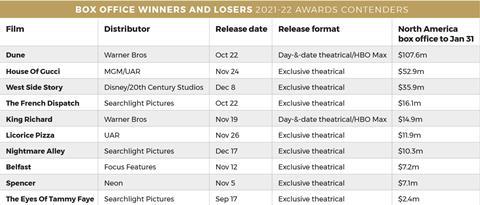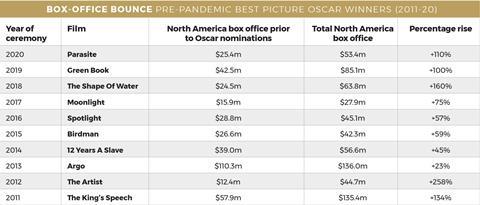Awards season was traditionally a period where films capitalised on nominations to achieve a vital box-office bounce. Screen assesses how key titles in the Oscar race are faring this year in a post-pandemic, shrunken-window world.

For years distribution executives would get a twinkle in the eye when conversation about their awards contenders turned to Oscar nominations. That precious period between the date of the nominations announcement and the Academy Awards themselves could boost box office by 50% or more — and even higher in the case of titles such as The Artist and The King’s Speech, both released by savvy awards-season player The Weinstein Company.
Yet in 2022, prospects for the so-called “awards corridor” are dim after the most tumultuous two years the film industry has ever seen. The rapid rise of streaming, compounded by the ongoing pandemic, has shaken the theatrical business to its core and given audiences — wary of venturing into public places — the ability to watch films from home far sooner than ever before.
It is a far cry from two years ago, when Bong Joon Ho’sParasite won four Oscars a month before pandemic lockdowns began. The day after its historic success on February 9, 2020, the South Korean sensation had climbed to $36.1m at the North American box office, some 42% higher than the $25.4m it had managed by January 12, the day before the announcement. By the end of its run, the total was up to $53.4m — more than double the number achieved prior to nominations.
One year prior, Green Book saw its box office leap by 64.5%, from $42.5m the day before nominations were announced on January 22 to $69.9m by February 25, a day after it was anointed best picture. The following week Universal expanded into 2,641 sites and the film settled on $85.1m by early May, earning twice what it had grossed prior to the nominations.
In 2019 and 2020, the standard exclusive theatrical window in North America was in the range of 75 to 90 days. Today it has settled on 30-45 days, with some releases from Universal and Focus Features going to PVoD as early as 17 days after theatrical release, a three-week window that independent distributors have also adopted on occasion.
Having experienced crests of hope and troughs of despair in between Covid-19 waves, distribution executives — speaking to Screen International ahead of the February 8 Oscar nominations announcement — accept they exist within a turbulent landscape like no other, and have resigned themselves to extracting whatever they can from a nomination.
With the exception of Spider-Man: No Way Home, an outlier that raced to $737m in North America and more than $1.74bn worldwide at press time, box office has moved in fits and starts. Against this listless backdrop hijacked by Covid-19, there can be no assurances of an awards bump as nobody knows when cinemagoing will return in a meaningful way.
Another factor is the scarcity of films still exclusively in cinemas by the nominations announcement date. Kent Sanderson, president of acquisitions and ancillary distribution at Bleecker Street, says most films, regardless of distribution strategy, are going to be on digital platforms in advance of the major nominations, given the new world. “I don’t think that’s going to change, even when the pandemic winds down, just by virtue of these new release models.
“We are looking at doing more 45-day theatrical releases next year like a lot of the studios are considering,” Sanderson adds. “If you do the math, regardless of when you release the movie within that awards corridor, even if you waited until the beginning of December, by definition if you give it a 45-day window you’re going to be available on some version of a home entertainment platform by Martin Luther King Day [the third Monday of January].”
Knock-on effects

Each case is different. 20th Century Studios’ West Side Story from Steven Spielberg and Searchlight Pictures’ Nightmare Alley from Guillermo del Toro have been particularly disappointing, earning — at press time — $35.9m in North America since December 10 and $10.3m since December 17, respectively.
Oscars success could have an impact. The critically acclaimed West Side Story has earned nominations from the producers, directors, writers and actors guilds and got a minimum 45-day exclusive theatrical release. Disney had not unveiled plans beyond the theatrical window at time of writing and it remains to be seen whether audiences will respond after the Oscar nominations come out.
Nightmare Alley — like fellow Searchlight contenders The French Dispatch and The Eyes Of Tammy Faye — received an exclusive 45-day theatrical run. It went to streaming platforms HBO Max and Hulu on February 1 in the hopes of reaching viewers and voters another way, and will continue to play in cinemas in both colour and black-and-white versions. “Those that want to see it on a big screen will go, but others will see it on Hulu or HBO,” says Frank Rodriguez, SVP general sales manager, Searchlight Pictures. “We’ve covered every base.”
Warner Bros duo Dune and King Richard are still in cinemas and at press time had earned $107.6m and $14.9m in North America, respectively, after opening day-and-date in cinemas and on HBO Max in accordance with the policy for Warner Bros releases in 2021. King Richard is also on PVoD. MGM/UAR’s House Of Gucci from Ridley Scott, a strong acting contender with SAG nominees Lady Gaga and Jared Leto, was nudging $53m at press time in North America and went to digital platforms more than one week before the Oscar nominations were announced. No Time To Die went to digital a month after its October 8 theatrical release and has taken $161m in North America, short of Spectre’s $200m in 2015 and Skyfall’s $304m in 2012.
Stablemate Licorice Pizza from Paul Thomas Anderson has been nominated by every major US guild and scored an impressive opening weekend per-theatre average of $83,852 when it played in four sites in late November. It continues to play exclusively in cinemas. Focus Features’ Belfast, another film that has been championed by the guilds and awards groups, opened November 12 in North America, reaching 1,255 cinemas at its widest point of release three weeks later, by which time it was also available on PVoD. It had grossed just over $7.2m by January 31 — and an impressive $8.3m in its first 10 days in the UK and Ireland.
Unlike the heavyweight Oscar contenders from the streaming world — such as Netflix’s The Power Of The Dog, Don’t Look Up and Tick, Tick… Boom!, Apple’s Coda, A24/Apple’s The Tragedy Of Macbeth and Amazon Studios’ Being The Ricardos, which have all received some sort of theatrical release, albeit on a generally smaller footprint — films from legacy studios would have been expected to make something out of the awards corridor as recently as a few years ago.
Taking the box-office bump out of the equation, distributors have been scrambling to re-engineer release campaigns and engage audiences. Bleecker Street set a September 24 release for Maria Schrader’s Silver Bear-winning I’m Your Man, the shortlisted German Oscar submission it acquired during Berlin 2021, only to pivot to a shorter theatrical window during a rise in infection levels. The sci-fi romantic comedy played three weeks exclusively in cinemas before moving to what Sanderson calls the “regular VoD” level of around $6.99.
“That helped the film find an audience,” he says. “When we picked up that film in Berlin last year, our hope was that it would have a more traditional window, but we pivoted as the Delta variant surged.”
The company also switched things around with Mass, its ensemble feature starring Ann Dowd and Jason Isaacs. The film opened on October 8 and Bleecker Street decided to keep it in cinemas for longer, aware the intense drama set in the aftermath of a school shooting would be more challenging for viewers on VoD than the lighter I’m Your Man.

“We wanted to give it every opportunity to find a theatrical audience because this film is so powerful when you see it with a group of people,” says Sanderson. “Secondly, with all these [awards] films hitting PVoD in the fourth quarter and all the Netflix contenders and streaming contenders dog-piling on the home entertainment landscape at the same time, we didn’t think there was an advantage to putting the film out on VoD immediately.” Mass, which received the Independent Spirits’ Robert Altman award for ensemble cast and has scored a number of critics groups’ nominations for Dowd, arrived on PVoD on December 28.
Quality control
In addition to the box-office turbulence, awards season has felt quiet. January has been a washout as awards groups cancelled or postponed shows, the beleaguered Hollywood Foreign Press Association handed out its Golden Globes behind closed doors, and in-person promotional events switched to virtual. Yet the quality of the awards contenders has been high and there are hopes that once winter passes and Omicron and the new BA.2 ‘stealth variant’ recede, Hollywood can get on with its in-person awards ceremonies scheduled from February onwards.
Meanwhile voters, like the non-industry public, have been watching films at home — in their case on the Academy’s screening portal. One leading awards campaigner does not think the disruption of recent times or poor box-office performance of contenders will matter. “I don’t think it’s going to hurt anybody this year, people know it’s a very challenged year. People are aware of the movies because there’s not much to do and the [Academy’s] streaming platform is pretty easy to use. People I know are just working their way through movies.”
The insider, who opined that this year at least “nobody cares” about the Globes awards, continues, “The streaming services have a huge leg-up during this period because they’re in everybody’s homes. Everybody you know has watched Don’t Look Up and it has become something that everybody’s seeing and talking about… With box office being so restricted, I’m not sure that consumers have gotten into the same habit of watching movies on a transactional basis as they have with watching movies on a streaming platform. So I definitely think movies on a streaming platform have a bit of an advantage.”
Streamer surge
According to one report in the trade press last year, Netflix saw a considerable viewership increase on films that received Oscar nominations in 2021. David Fincher’s Mank, for example, experienced a 702% rise — from the previous week — in the number of accounts that viewed the film in the seven days after it earned 10 nominations. Crip Camp saw a 446% rise and Ma Rainey’s Black Bottom 150%.
That kind of bounce could reverberate through all the streaming platforms this season with their growing slate of awards hopefuls. As for the theatrical distributors who have traditionally relied on box office and the awards corridor bump to get their films seen and heard and into profit, there is cautious confidence that audiences will return and prestige awards contenders will still get made, bought and released.
Searchlight’s Rodriguez is optimistic it is a matter of time before the US turns a corner in the pandemic, as the UK and other countries have done. He accepts more mature audiences will be cautious, but has been encouraged by attendance levels during Covid lulls. “Toward the end of October, we had a per-screen for The French Dispatch of $25,000. That to me is success and tells me audiences will come back as long as the product is there and the windows are there long enough for some films.”
Sanderson declares himself “very happy” with results on VoD for Bleecker Street films and the titles released via Decal, the home entertainment joint venture with Neon. Yet he concedes theatrical releases and the way campaigns generate conversation and create financial impact downstream are irreplaceable.
He says that is why Bleecker Street strives to protect the theatrical window and ensure prestige releases are events, citing the upcoming Golda Meir biopic Golda starring Helen Mirren, which is in post. “We’re eyeballing for that older, sophisticated audience theatrically to go into Q4. We boarded at financing stage because we believe that kind of awards high-calibre, big movie can thrive theatrically as audiences come back.”


























No comments yet